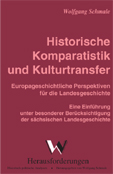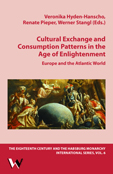Zu diesem Buch

Cultural exchange and the emergence of consumer societies are two major fields of research for cultural historians. Former studies on cultural exchange focused on
France and Continental Europe, similar to the history of consumption has been mainly studied with regards to the British Empire and the industrialization. In contrast to such a
narrow scope, the current volume broadens the research perspective: the integration of both approaches to one entangled history of Europe and the Atlantic World with a
strong focus on material culture in the Age of Enlightenment is the objective of this book. Therefore, the aim of the book is threefold. In a first step, the common theoretical
framework of cultural exchange and consumption patterns is expanded. Secondly, attention is paid to major European players who had direct transatlantic
connections and also acted as intermediators for Central Europe. The third emphasis is laid on the changes in Central Europe itself. Furthermore, the volume includes European
ties with Africa in its analysis, traces African products in European material culture and considers African-American relations, too.
Together, the articles assembled in this book fuse the concept of cultural exchange with the history of consumption by taking specific examples of transfers in many
possible directions within the Atlantic World. Thus, the Atlantic is considered to be not only a space of contact and exchange, but also a center of cultural diffusion and a
creative catalyser. Atlantic Europe, the Americas and Africa are dealt with in this book as immediate spaces where the impact of material exchanges leads to cultural adaptions
and new forms of social interaction. One can even follow these transatlantic exchanges and associated cultural practices to Central Europe. Some of the included contributions
clarify how exchanges spark, intensify, or hamper intellectual currents. Further articles consider the role of institutions and general social practices, others personal agents, or
specialize on the interplay of these factors.
The current volume reflects the broad range of cultural exchanges via the Atlantic and thus contributes to integrate these processes in a general vision of emerging transatlantic
consumer societies and the consolidation of a common European cultural space, because the Atlantic World was already mutually entangled to a very high degree at the
end of the 18th century. Europe, the Americas and Asia were more interconnected at the end of the Ancien Régime than ever before. This interconnectedness
influenced knowledge, people, and people’s behavior to a large extent. Thus, the globalization of the 19th century had a solid basis to build upon.

Kulturelle Transfers und Konsum sind zwei wesentliche Forschungsfelder der jüngeren Kulturgeschichte. Während sich die bisherige Untersuchungen
kultureller Transfers hauptsächlich auf Frankreich konzentrierten und eine Geschichte des Konsums meist mit Bezug auf das Britische Empire geschrieben wurde, verfolgt
der vorliegende Band einen anderen Ansatz. Das Ziel der Herausgeber ist eine Verbindung der beiden Forschungsfelder zu einer verflochtenen Geschichte Europas und der
atlantischen Welt mit einem Fokus auf der materiellen Kultur im Zeitalter der Aufklärung. Ein Ziel, das der vorliegende Band in dreifacher Hinsicht verfolgt: Erstens
werden die geläufigen theoretischen Modelle vorgestellt und mit Blick auf das Thema entscheidend erweitert. Zweitens werden die europäischen Kolonialmächte
sowohl im Rahmen ihrer direkten transatlantischen Verbindungen, als auch in ihrer Rolle als Vermittler betrachtet. Drittens werden die Einflüsse auf und in Zentraleuropa
selbst untersucht. Darüber hinaus werden die europäischen Beziehungen zu Afrika beleuchtet, die Spuren afrikanischer Produkte in der materiellen Kultur Europas
werden verfolgt, und auch das afrikanisch-amerikanische Verhältnis wird mit einbezogen.
Die in dem vorliegenden Band versammelten Beiträge verbinden das Konzept von kulturellen Transfers mit einer Geschichte des Konsums anhand spezifischer Beispiele
kultureller Transfers in alle erdenkliche Richtungen innerhalb und aus sämtlichen Regionen der atlantischen Welt. Der Atlantik selbst, wird dabei nicht nur als ein
Raum des Kontakts und Austauschs betrachtet, sondern zugleich als ein kultureller Katalysator und das Zentrum einer kulturellen Diffusion verstanden. Durch die Untersuchung
materieller Transfers werden in Europa, Amerika und Afrika kulturelle Adaptionen und neue Formen sozialer Interaktionen ausgemacht und dargestellt – eine Entwicklung
die sich anhand der Beiträge bis nach Zentraleuropa verfolgen lässt.
Der vorliegende Band spiegelt die gesamte Bandbreite kultureller Transfers innerhalb der atlantischen Welt wider und trägt so dazu bei, diese Prozesse in eine
Geschichte der Entstehung und Konsolidierung transatlantischer Konsumgesellschaften und eines einheitlichen europäischen Kulturraums einzuordnen, denn bereits am
Ende des 18. Jahrhunderts war die atlantische Welt in einem hohen Maß verflochten. Die wechselseitigen Verknüpfungen und Transfers beeinflussten das
Wissen, die Menschen sowie das Verhalten der Menschen entscheidend und legten den Grundstein für die Globalisierung im 19. Jahrhundert.
Content
Veronika Hyden-Hanscho, Renate Pieper, Werner Stangl
Introduction
Wolfgang Schmale
Theory and Practices of Cultural Exchange within Europe
Bartolome Yun-Casalilla
The History of Consumption of Early Modern Europe in a Trans-Atlantic Perspective: Some New Challenges in European Social History
Cesar Manrique Figueroa
New Spain's Imports of Culture from the Southern Netherlands. The Case of Books
Ludolf W.G. Pelizaeus
Media Control Between Spain and Colonial Mexico at the End of the 18th Century
Jose Enrique Covarrubias
Alexander von Humboldt on Luxury, Consumption and Economic Prosperity: A Contribution to the Study of Cultural Exchange
Michael North
Towards a Global Material Culture: Domestic Interiors in the Atlantic and Other Worlds
Judith A. Carney
African Plant and Animal Species in 18th-Century Tropical America
Henk Den Heijer
Africans in European and Asian clothes. Dutch Textile Trade in West Africa, 1600-1800
Jutta Wimmler
Material Exchange as Cultural Exchange: The Example of West African Products in Late 17th and Early 18th-Century France
Veronika Hyden-Hanscho
Beaver Hats, Drugs and Sugar Consumption in Vienna around 1700: France as an Intermediary for Atlantic Products
Irene Fattacciu
Exotic Products, Luxury and New Forms of Sociability: Changing Patterns of Consumption in 18th-Century Madrid
Benita Wister
Chocolate Consumption in Westphalia and Styria during the 18th Century
Renate Pieper
From Cultural Exchange to Cultural Memory: Spanish American Objects in Spanish and Austrian Households of the Early 18th Century
Abstracts



